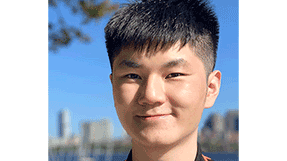Research fellowship in biomedicine inspires Hoyin Chu to serve greater good
Author: Kelly Chan
Date: 01.21.21

Hoyin Chu found his love for computer science and machine learning by accident. But now, he wants nothing more than to apply artificial intelligence and technology to serve the greater good.
For 10 weeks in the fall, Chu, a fifth-year computer science and mathematics combined major, took part in the Civic Digital Fellowship, which gave him the opportunity to work as a data scientist at the National Institute of Allergy and Infectious Diseases, or NIAID. Since this ran for half a semester, Chu was able to split his fall into two co-op experiences, with the Fellowship being his latest one.
In working for a government organization, Chu valued how his work in technology would be used for public service.
“The work that you’re doing here is not for advancing corporate interest,” he said. “It’s for the people.”
The Fellowship program is hosted by Coding it Forward, a nonprofit organization that partners with federal agencies to connect technology students to opportunities for social impact.
“The main goal of the Fellowship is two-fold,” said Ariana Soto, director of strategic initiatives. “One is to expose students to the civic-tech space and show them how impactful their work can be working in the public sector. The other end of that is bringing tech talent to the federal government because Fellows are really able to do high-impact work.”
At NIAID, Chu’s work revolved around “metadata,” or data about other data. Chu created a program that compiled reports on requests for access to the database of Genotypes and Phenotypes, or dbGaP, which is filled with genomic data collected from various studies. Scientific researchers from all over the world, especially from academic institutions, requested to use this database, he said, and there are data access committees that approve each request.
With this technology, these access committees will be able to function more easily and efficiently, he said. Through these automated reports, they can understand more information about the requests individually and as a whole, which will inform them on how to improve the approval process as well as what types of genomic data are gaining popularity.
While his program has not been used just yet, Chu is excited that his technology will benefit the institute, as it will save time for the committees and allow them to focus on other scientific policies.
“The fact that you can see the work that you do will be able to help people who will be making decisions on the lives of millions of people is super rewarding,” he said.
Because NIAID is one of many within the National Institutes of Health (NIH), Chu was given several opportunities to present his work to other NIH leaders who may want to apply it elsewhere — an opportunity that distinguished this program from his past co-ops.
“The point of your work is so that other people can also use it,” Chu said. “By having these presentation opportunities, [institute leaders] can get to know about a cool tool being developed by a Fellow at another institute … and use it for their own institute as well.”
These presentations, Soto said, are proof of how important the work that Fellows like Chu do through this program.
“Students really do have such a big impact at the agency that they’re working at during the 10 weeks,” Soto said. “We don’t even have to try to publicize the work that they’re doing — their work really speaks for itself.”
Throughout Chu’s childhood in Guangzhou, China, and his middle and high school years living in Manhattan, he always loved mathematics. When applying to Northeastern, he chose it as his major, but he also applied with computer science as a secondary major on a whim, simply thinking it would be fun to learn how to code.
Entering his first semester with a combined major, he took Fundamentals of Computer Science, or “Fundies,” where he learned DrRacket, an uncommon programming language that made him fall in love with the subject.
“A lot of students don’t like it because it’s really obscure and they’re not familiar with it,” he said. “But it was actually super mathematical, in a sense, and it is what got me hooked [on computer science].”
Later, Chu found that he was driven to study machine learning, and he specifically wanted to apply it to the biomedical world and help people on a large scale.
The Civic Digital Fellowship was his first introduction to biomedicine, and he loved how the passions of everyone he worked with and met were rooted in altruism.
“When you actually go into [the field], you’ll see that the people who work in this space are some of the nicest people you’ll meet,” he said. “They’re here to work for a mission that’s bigger than themselves.”
Earlier this fall — for the first of his two co-ops this semester — Chu conducted research alongside Professor Predrag Radivojac, who is the director of Khoury’s data science master’s program. Using machine learning and large datasets, Chu helped Radivojac look for causes behind adverse pregnancy outcomes, such as preterm birth and gestational diabetes, to ultimately help women with pregnancy in the future.
With these two experiences this past semester, Chu admires his professor and colleagues as role models for their dedication to serving the public.
“It’s hard to find someone who does not inspire me,” he said, smiling.
As Chu embarks on his last semester at Northeastern and applies to graduate school for machine learning, he knows his main career goal is to do work with a large public impact.
“One thing for sure is that I’ll use what I learned from [the Fellowship] and my machine learning or AI knowledge for projects that will change people’s lives.”